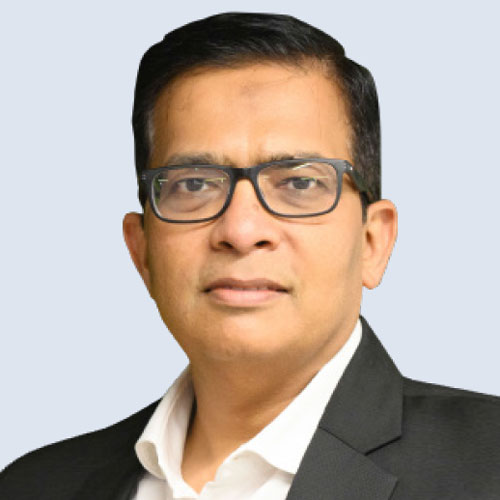Mr. Krishna Sanghavi
Chief Investment Officer at Mahindra Manulife – Equity
Mr. Krishna Sanghavi is a CMA from Institute of Cost and Works Accountants of India and has also done MMS in Finance. Mr. Krishna Sanghavi has over 27 years of work experience of which around 14 years have been in the Mutual Fund Industry and around 8 years in Life Insurance Industry. He was also associated with Canara Robeco Asset Management Company Limited, Kotak Mahindra Asset Management Company Limited and Aviva Life Insurance Company India Ltd. as ‘Head of Equities’. In these roles, he was responsible for managing and overseeing the Equity Portfolios.
Q1. We have entered the last month of the current financial year. What is your outlook for the markets in near term say FY 24-25?
We need to evaluate markets in twin context of global sentiments and domestic fundamentals. Globally the sentiments are strong towards risk assets (including equities) driven by expectations of monetary policy easing by US Fed and other large central banks. Any change therein can impact global markets on sentiments front and India too will have its own share of impact.
When looking at domestic fundamentals, we expect economy to be driven by a reasonably supportive policy framework post elections, aggressive capex cycle across manufacturing, core economic sectors (Power, Metal, Refinery etc) as well as infrastructure, strong balance sheet of banks to support lending. PSU divestments too can be a theme likely over next 12-18 months. From equity market angle, good economy is likely to be reflected by way of buoyant markets supported by flows from domestic s well global investors.
Q2. India right now is at a very bright spot when compared to other economies. Where do you think the market is in terms of valuation? Is valuation a red flag in some areas for you?
Being in a Bright spot typically means the valuations too are bright, with some degree of variation. Yes, Indian markets are reflecting the healthy economic fundamentals where Indian economy is likely to double in next 6-7 years in nominal terms, gaining rank from 5th largest to 3rd largest economy in world. From absolute context, large caps are in line with average valuations over past 5-7 years while mid and small caps are trading at some premium. And we have seen this in past where valuation gaps are created between large mid n small caps where each of these takes lead and cedes lead for a brief period but over medium to long term, all grow together. Valuation being a red flag in some areas is a true phenomenon at any point of time market, just that the pocket of over valuation keeps on changing.
Q3. What are the key challenges you foresee for the markets in FY25?
From investor perspective two big risks in markets are “high expectations post a very good FY24” and “increasingly leveraged route to participate in markets”. From economy angle, markets need global economy to pick up and support export led growth while valuations necessitate easy monetary policy stance by US Fed and other large central banks.
Q4. Sticking with the ‘Amrit kaal’ theme, can the financial market economy outperform the actual economy? What are your thoughts?
When we look at past 15-20 years, Indian financial markets have managed to outperform the growth in nominal economy. We expect this trend to continue in this Amrit Kaal theme.
Q5. What are your thoughts on SEBI's move to restrict flows into midcap and smallcap markets? The regulator has called that space slightly frothy. What's your take?
In our view, there will be at times pockets within all market caps which are overvalued or have higher liquidity risk. Having better disclosures is always good for investors, and we think that these recent steps are in that direction. What is much more important at these times is to ensure you are not influenced by recent past performance, have a long-term frame in mind while investing, and stick with diversified funds.
Q6. Which sectors or themes have you been reading and researching about or what are the latest additions to your funds?
We have been working on understanding the likely implications of Amrit Kaal in terms of growth potential across sector. As a macro theme, as India embarks on import substitution &/or export, Indian factors of production (land, labor, capital, resources like metals n power n fuels) will end up replacing the same factors of production in other countries. India will need to create capacities to meet the need for higher usage of these factors, including skilling of workforce, setting power plants, metal plants, refineries etc.
Simultaneously, as growth in capex gets spread to growth in income for workforce, consumption will also increase over this period. We have been adding companies that fit these themes.




